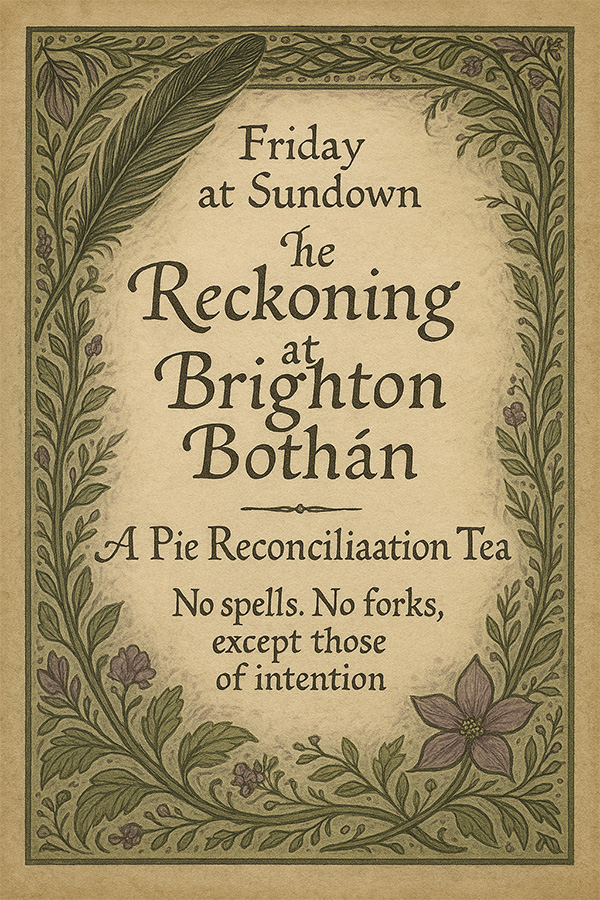Purrport

Effective immediately entry visas for seagulls have been suspended pending investigation into last Thursday’s pastry incident. |
Character
Profiles
The Cancer Sisters
No one agrees if they’re actual sisters or just three women born under the same moon with matching silver brooches and a fondness for cardigans with deep pockets. They live together in the red-brick house with the lavender hedge and an antique barometer that rings like a bell when there’s news.
Names: Elsie Marla and June (though they answer to each other’s names with no complaint)
Occupation:
“Civic Oversight & Custard Experiments" (self-declared)
Astrological Note: All born in July. All swear by the moon. All bake with nutmeg.
They sit on every committee argue in perfect chorus and carry handbags heavy with documents tea bags and--allegedly--a curse or two. They remember everything and forget nothing they shouldn’t. Their official role in the Shadows Committee is listed as “Triangulation."
The Cancer Sisters believe in signs omens matching umbrellas and the right to intervene “when matters lean mystical."
Orla Merrin once drew them as three swans in hats paddling under a crescent moon.
They framed it naturally and hung it in the downstairs toilet.
Attributes
Cancer Sisters
Warm communal intuitive
Born in July lunar-guided
Custard & cardigans
Civic meddling with a smile
Drawn as swans
Committee minds
Rule-keepers
New Constellations
|
The Cancer Sisters' Constellation |
The Snake Sisters' Constellation |
Episode Two -- The Tarp Is Unfolded
By Wednesday morning a great canvas tarp had appeared at the crossroads--greenish-grey stitched with twine and weighted at the corners with bricks that hadn’t been made in this century. No one saw who placed it there. No one dared move it. By midday children had begun throwing breadcrumbs toward it to see if it would twitch.
“I think it’s breathing " said Nellie-from-the-library. “Or sulking."
The Shadows Committee remained silent. Only a single update was added beneath Monday’s notice:
UPDATE: The Structure in question has accepted its fate. Please prepare biscuits strong rope and silence.
The villagers were now in two minds. Half said it had to be the Witches’ House because the windows had all fogged up with no weather to blame. The other half insisted it was City Hall and that Mayor Fogarty had finally been outvoted by the roots beneath the floor.
That evening as the bells of St. Declan’s rang of their own accord a pair of strangers were seen walking the lane beside the lake. One carried a long brass key. The other a velvet rope. Neither one spoke but Orla Merrin--crouched behind a blackthorn hedge--took out her notebook and began to sketch.
Whatever it was it would move tomorrow.
And it would not be empty when it did.
Episode Three --The Day of Shifting
Friday arrived not with sunrise but with fog--thick and low smelling faintly of peat iron filings and boiled barley. It rolled in from the lake like an ancient breath and by eight o’clock not a soul in the village could see further than their own outstretched hand.
Then just as the town bell struck a hollow ninth note (though there were only ever eight) a sound echoed through the fog: groaning wood rope under tension and a faint rhythm like chanting--or humming.
By the time the mist cleared the villagers found themselves gathered around the great tarp. But it had shifted. Now it covered something larger.
The velvet rope had been uncoiled.
The brass key had disappeared.
And the Shadows Committee had posted a new message:
RELOCATION COMPLETE.The Witches’ House has accepted the move.Visitors welcome by appointment only. Leave bread at the step. Do not look directly at the chimney.
Where had it gone? Just west of the alder grove in the patch of land that hadn’t existed last week. A quiet clearing now housed the crooked house--its shutters blinking its porch slightly crooked its roof muttering in the wind.
Tie One On swore it had always been there. Bree Whinny cried foul. The Cancer Sisters hosted a potluck.
But Orla Merrin standing by the garden gate whispered into her notebook:“It’s not over. She’s only just settled in."
And the house--if you listened closely--was laughing.
Epilogue: The Empty Foundation
Three days later a boy named Finbar poked around the patch of land where the Witches’ House used to sit. He was looking for marbles--or a dare--or both. But what he found was a hollow. Not a ruin or a mess. A hollow perfectly shaped like a memory had been scooped clean from the soil.
The grass refused to grow back. Birds flew over it but never landed. Dogs howled when walked too near.
And on the fourth night a single daisy bloomed in the centre.
It had twelve petals. And a thirteenth that folded back into itself as if waiting.
Orla Merrin pressed a leaf into her notebook and labelled it: “Where a house once dreamed."
And then she turned the page.
-----------------------------------